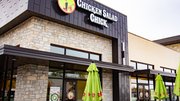Article
Taxing the industry
As the NRA calls for looser credit and better tax incentives in 2010, the breaks to be available this year are anybody's guess.

February 2, 2010
President Barack Obama's Jan. 27 State of the Union speech echoed the restaurant industry's call for looser credit and better tax incentives. But restaurant owners wonder what lawmakers will make of his plea, and whether tax breaks that will help them recoup money from 2009 will survive for 2010.
Michael H. Karu, CPA/CFF, a New Jersey-based accountant with several restaurant clients, doesn't have much hope for the passage of favorable small-business tax legislation. "We just kind of sit back and wait," he said.
He's more concerned, like many in his industry, about the ongoing health care battle, and its own set of tax implications. And he's happy that no laws have been passed, for now.
"That would have required additional tax, and made for a lot of difficult decisions," Karu said. "[Restaurants] may have had to cut jobs just to afford these other taxes."
Rich Yelton is more fixated on the present. Yelton leads Windham Brannon's Restaurant Services tax division in Atlanta. He said there were a lot of tax breaks extended for small businesses in 2009 that benefited struggling restaurateurs, and he's helping his clients make the most of them right now. But he still worries whether his clients will be able to take them again next year.
Now and Later
Some of the most beneficial tax breaks for small business restaurateurs also are the most questionable for continuation. Recently expanded depreciation and small business employer tax laws will help owners with their 2009 returns — but, there's not really a set timeline for their extensions.
"From our standpoint, there's a lot of unfinished business from 2009," said Dave Koenig, tax director for the National Restaurant Association. "One of the main provisions we were working on was the extension of a temporary provision that expired at end of 2009, which allowed restaurants to write off or depreciate improvements to their property."
Graces Under Fire These recently augmented tax breaks will help restaurateurs who file this April. But whether they'll be able to use them again next year is anyone's guess. Qualified restaurant improvements:The recent augmentation of qualified restaurants improvements allows restaurateurs who bought property in 2009 to claim depreciation over 15 years instead of the previous 39. Bonus depreciation:With this law, restaurateurs are able to recapture 50 percent of items' costs via first-year write-offs, then depreciate the remaining balance over time. Work Opportunity Tax Credit:The provision gives business owners a credit of up to 40 percent of the first $6,000 of wages paid to employees in certain less-employed groups. Last year that group was extended to include unemployed veterans and "disconnected youth." Other groups include ex-felons and welfare recipients. Extension of claimable net operating losses:Law was recently amended to allow restaurateurs to claim losses from five years back (instead of two). |
Officially deemed "qualified restaurant improvements," this provision allows restaurateurs to claim depreciation on buildings more than twice as rapidly as before. Koenig said it helps with cash flow.Other helpful tax laws extended in 2009 included bonus depreciation, which immediately helps defray the cost of kitchen equipment.
Finally, more than just restaurateurs will suffer if the Work Opportunity Tax Credit, which gives business owners credit for employing certain less-employed groups, becomes more restrictive. The pool of pertinent employable workers was expanded for 2009.
Future unknowns
Tax areas with less immediate precedence also concern industry leaders. Many legislators and restaurant association officials have expressed interest in the fate of Bush's 2001 tax cuts, set to expire this year.
Those could climb from a 35 percent max tax rate for individuals to a rate of 39.6 percent. Yelton said this could affect business owners with a pass-through entity structure — such as many franchisees — where taxes are paid at the owner's level.That could lead some businesses to change to a corporation structure, if talk about reducing corporate tax rates from 35 percent to as low as 25 percent comes to fruition.
Whether this legislation is enacted, a less imminent proposition is one the IRS advanced just last week concerning uncertain tax position disclosure. Under the proposition, any business with $10 million or more in assets — such as a multiunit fast casual franchise — could be required to flag those areas where less-solid deductions were taken.
"That would be really groundbreaking to ask of businesses," Yelton said. "If you ever were audited, it would definitely give the IRS a roadmap of what to look at."
Going forward
President Obama's recent speech addressed some small business concerns, including helpful tax propositions and the closely related issue of credit availability. After the speech, the National Restaurant Association issued a statement of support for businesses' enhanced deduction for expensing, which would allow workers to expense 80 percent instead of 50 percent of meals out. Karu said that measure, if enacted, would help a bit, but it's not going to save the industry.
But both the National Restaurant Association and International Franchise Association placed the most emphasis on the need for more effort to support access to credit and start-up capital.
"IFA appreciates the efforts to date by the president and Congress to support many of our recommendations to improve credit access," IFA CEO Matthew Shay said in a response to the State of the Union address. "But, now is the time to put that support into action."
* Photo by AlanCleaver
 ChatGPT
ChatGPT Grok
Grok Perplexity
Perplexity Claude
Claude












